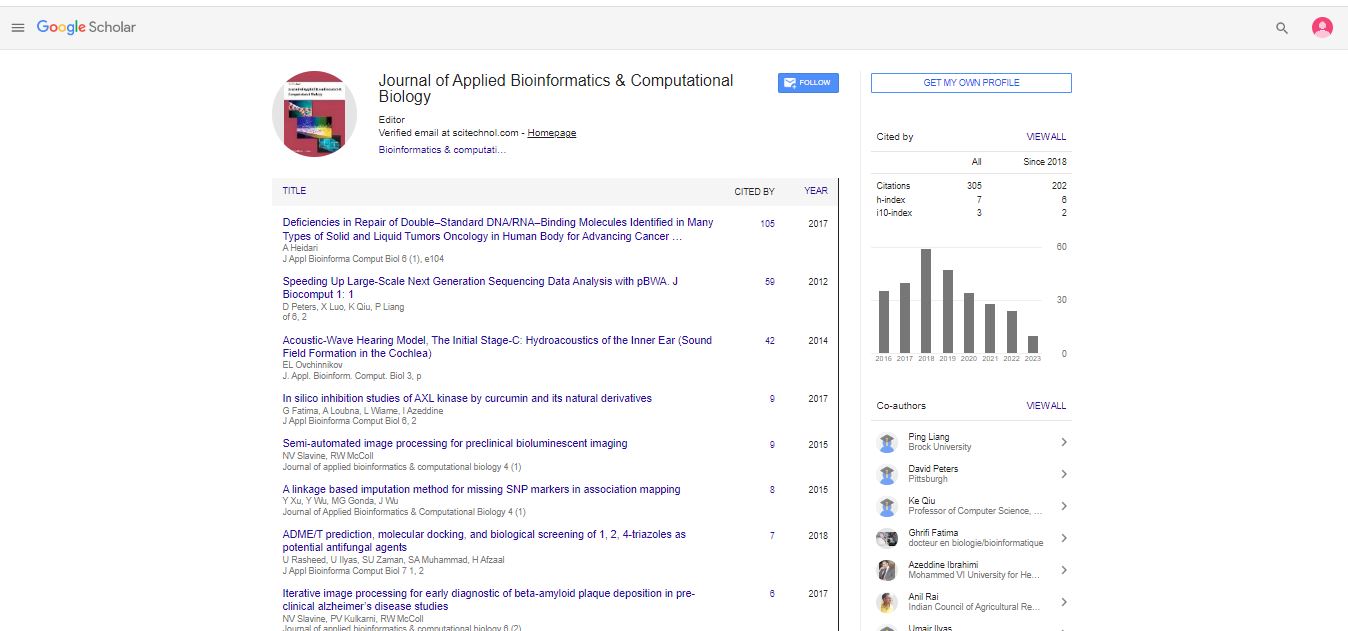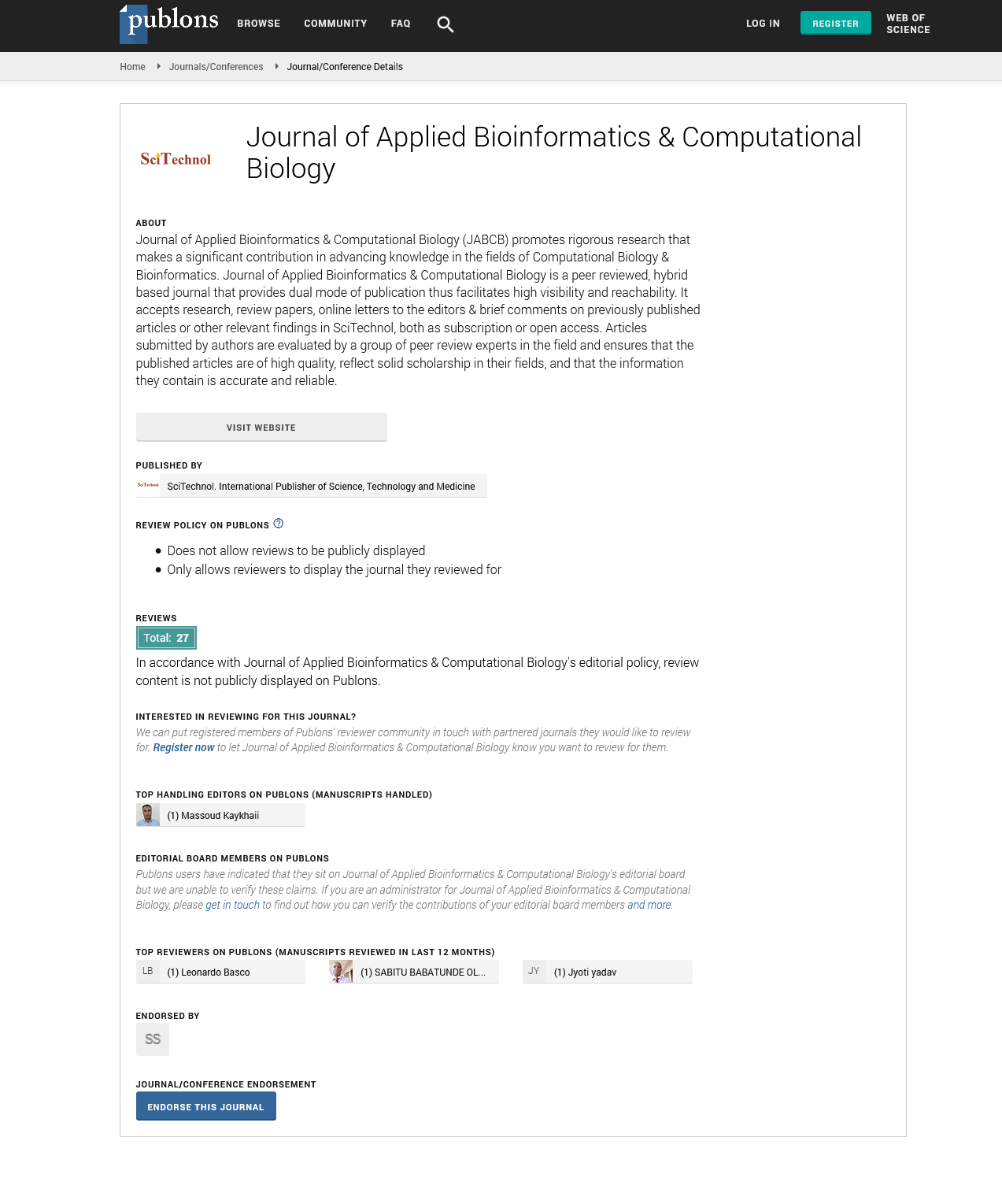Perspective, Vol: 12 Issue: 3
Role of In silico technology in Future Research
Audrone Williams*
1Department of Biology, University of Copenhagen, Copenhagen, Denmark
*Corresponding Author: Audrone Williams,
Department of Biology, University of
Copenhagen, Copenhagen, Denmark
E-mail: willims@andro21.edu
Received date: 27 May, 2023, Manuscript No. JABCB-23-107652;
Editor assigned date: 29 May, 2023, Pre QC No. JABCB-23-107652 (PQ);
Reviewed date: 15 June, 2023, QC No. JABCB-23-107652;
Revised date: 23 June, 2023, Manuscript No. JABCB-23-107652(R);
Published date: 30 June, 2023, DOI: 10.4172/2327-4360.1000273
Citation: Williams A (2023) Role of In silico technology in Future Research. J Appl Bioinforma Comput Biol 12:3.
Description
In the ever-evolving landscape of technology and science, researchers and scientists are continually pushing the boundaries of what is possible. Among the latest innovations, in silico technologies have emerged as powerful tools that simulate and model complex systems in a virtual environment. Derived from the Latin phrase "in silico," meaning "in silicon," these technologies harness the immense computing power to accelerate research, drug discovery, and various scientific endeavors. This article delves into the world of in silico technologies, highlighting their applications, advantages, and potential for revolutionizing research in the digital age.
In silico technologies refer to the computational methods and simulations used to analyze and model biological, chemical, and physical phenomena. These techniques aim to replicate real-world scenarios within a virtual environment, enabling researchers to gain valuable insights into complex systems. In silico technologies utilize sophisticated algorithms and computational models to predict behavior, interactions, and outcomes without the need for costly and time-consuming experiments.
Applications in drug discovery
One of the most promising areas where in silico technologies shine is drug discovery. The traditional drug development process involves screening thousands of chemical compounds in a laborious and expensive manner. In silico methods streamline this process by using computational models to predict a molecule's potential for binding to a specific target, as well as its safety profile. This approach significantly reduces the number of compounds that need to be synthesized and tested in the lab, thereby accelerating the drug development timeline.
Additionally, in silico technologies play a vital role in personalized medicine. By analyzing a patient's genetic data, researchers can create virtual models to simulate drug interactions and predict individual responses to specific medications. This level of precision medicine has the potential to revolutionize healthcare, tailoring treatments to suit the unique genetic makeup of each patient.
Advancements in structural biology
In silico technologies have also revolutionized structural biology by enabling researchers to study the three-dimensional structures of biomolecules. Through molecular dynamics simulations and protein folding algorithms, scientists can explore how proteins interact with other molecules and gain insights into their functions. This understanding of protein structures and interactions is crucial in drug design, as it aids in the identification of potential drug targets and the optimization of drug candidates for maximum efficacy.
Modeling complex systems
In silico technologies extend beyond biology and chemistry into fields like physics, climate science, and engineering. Complex systems, such as weather patterns, ecological networks, and transportation logistics, can be simulated and analyzed using computational models. These simulations allow researchers and policymakers to explore different scenarios, predict outcomes, and make informed decisions.
For example, climate scientists leverage in silico models to understand climate change, predict its impact on the environment, and propose mitigation strategies. Similarly, engineers use Computational Fluid Dynamics (CFD) to simulate fluid flow in aircraft engines, reducing design costs and improving performance.
Challenges and Limitations
While in silico technologies offer numerous advantages, they are not without challenges and limitations. The accuracy of predictions heavily relies on the quality of input data and the complexity of the models used. Biomedical simulations, for instance, depend on accurate biological data and well-validated algorithms. Incomplete or incorrect data could lead to misleading conclusions and compromise the reliability of the results.
Another significant challenge is the need for high-performance computing resources. Complex simulations can be computationally demanding, necessitating powerful hardware and substantial processing capabilities. As technology advances, this limitation is gradually being addressed, but it remains a barrier for some researchers.
Moreover, in silico technologies may not fully replace experimental methods in all cases. Certain phenomena are challenging to simulate accurately, and experimental validation remains essential for confirming the results obtained through computational modeling.
As in silico technologies become increasingly powerful, ethical considerations come into play. For example, the use of AI and machine learning algorithms to analyze vast amounts of patient data raises concerns about privacy and data security. Proper regulations and guidelines must be in place to ensure the responsible use of these technologies and safeguard the interests of individuals and society as a whole.
In silico technologies are a remarkable set of tools that have the potential to transform scientific research and revolutionize various industries. From drug discovery to climate modeling, these virtual simulations offer a cost-effective, time-efficient, and environmentally friendly approach to solving complex problems. While there are challenges and ethical considerations to address, the continued development and integration of in silico technologies into scientific research hold the promise of a brighter, more informed future for humanity.

